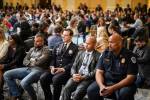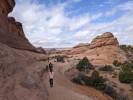Network’s goal is to educate public about organ donation

Henderson resident Lisa Intravaia works and volunteers for her “angel.”
After successfully receiving a kidney-pancreas transplant almost 17 years ago, the registered nurse began volunteering with the Nevada Donor Network.
“I do this to honor my donor,” Intravaia said. “We’re all here to pass on our respects and gratitude for those who have donated and their families. They’re our angels.”
With more than 123,000 people on the nationwide organ transplant waiting list, the Nevada Donor Network aims to raise awareness and educate the public on becoming registered donors through community events.
The network’s community services coordinator, Kelli Little, said it is responsible for allocating organs, consulting families, obtaining medical history and working with the community.
“People can donate kidneys, pancreas, heart, lungs, liver and intestines,” Little said. “Kidneys make up the majority of people waiting on the list, and intestines are the least common to transplant.”
Along with organs, registered donors also can donate tissues, skin, bone and tendons.
“With organs, one donor can impact up to eight lives,” she said. “With tissue, it can benefit up to 50 people.”
Individuals on the list can wait weeks to years to receive a transplant, depending on which state they live in and what organ they need. University Medical Center, 1800 W. Charleston Blvd., provides only kidney transplants, so many of the 570 individuals listed in Nevada are also listed in other states.
“There are about 18 people dying every day who are on the waiting list,” Little said. “There’s what we’re calling an ‘organ shortage’ because more and more people are being added to the list, but there’s not enough donors. Only about 40 percent of people in Nevada are registered donors.”
Little said the network hopes to address many myths and misconceptions that prevent individuals from registering.
“Many people think that if you’re an organ donor and end up in the hospital that you’re not going to get saved,” Little said. “That is so far from the truth for multiple reasons, the No. 1 being that transplants are a specialty, so the people working in the ER or ICU are not the same people working in the transplant field.”
Another misconception is that donors will not be able to have open-casket funerals after the organs and tissues are recovered.
“There may be changes in physical appearance, but we make every effort to minimalize it,” said Kate McCullough, community services supervisor. “If the family communicates with us, we can accomodate specific requests based on the funeral arrangements.”
Registering as a donor is legally binding, and it’s recommended families discuss the decision.
“Our staff is aware of the emotional toll grief can take on the family,” McCullough said. “We will always work closely to help them understand the donation process and the following steps.”
Little said the network focuses on educating the public and getting them to register.
“If you have all the accurate information at the end of the day, and you’re still against it, we completely understand,” Little said. “It’s not our job to push anyone into it. We just want to make sure people are making that decision for the right reasons.”
Spring Valley resident Robert Gilbreath was forced to make the decision for his 22-year-old son Josh after he died in December 2011. His kidneys and liver were placed with three recipients.
“My son died Dec. 13, and his liver was placed with a woman who wasn’t expected to survive past Christmas that year,” he said. “It was really emotional, but it helped in our healing process knowing that some good came out of a tragedy.”
Since Josh’s death, Gilbreath said he registered as an organ donor and continues to volunteer with the network.
“Understandably, it is a deeply personal decision,” Gilbreath said. “You have to look into yourself and ask, ‘Is this the legacy I would like to leave for myself? Do I want to possibly save someone’s life?’ Me? Yes, I do.”
For more information, visit donatelifenevada.org or call 855-683-6667.
Contact Henderson View reporter Caitlyn Belcher at cbelcher@viewnews.com or 702-383-0403.


















